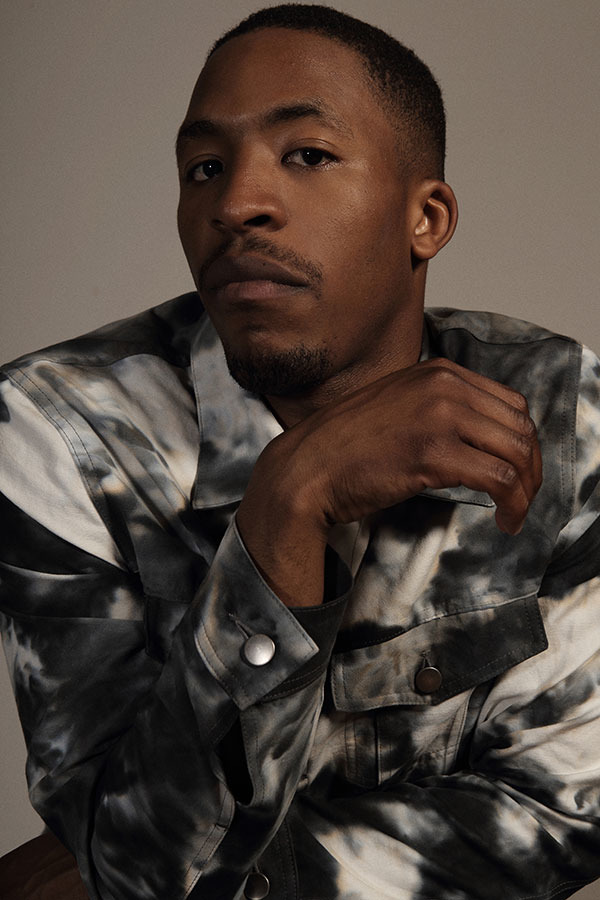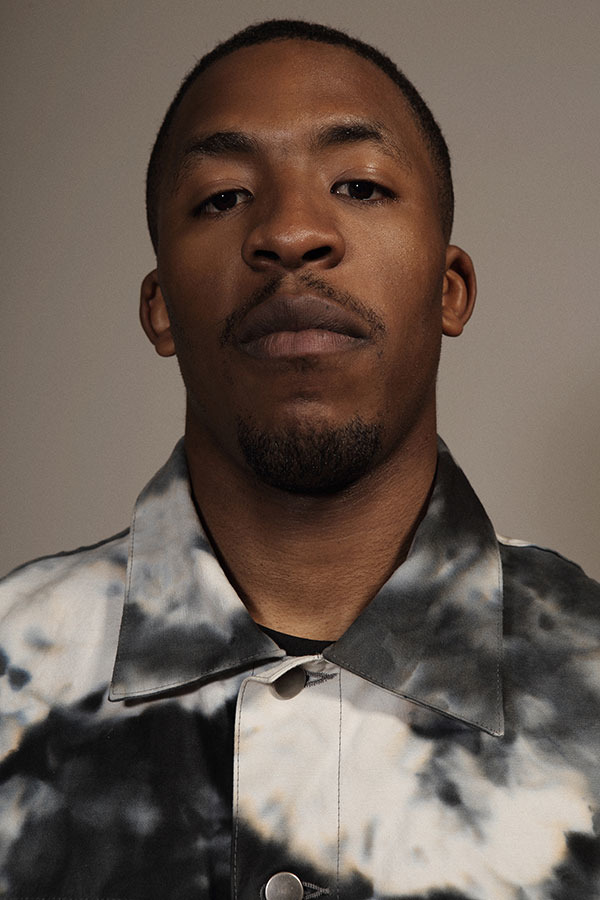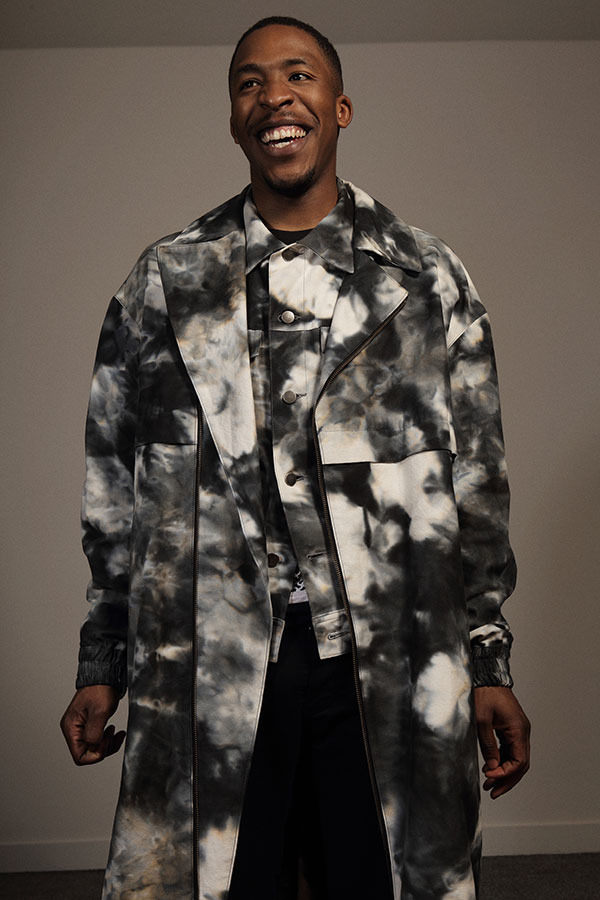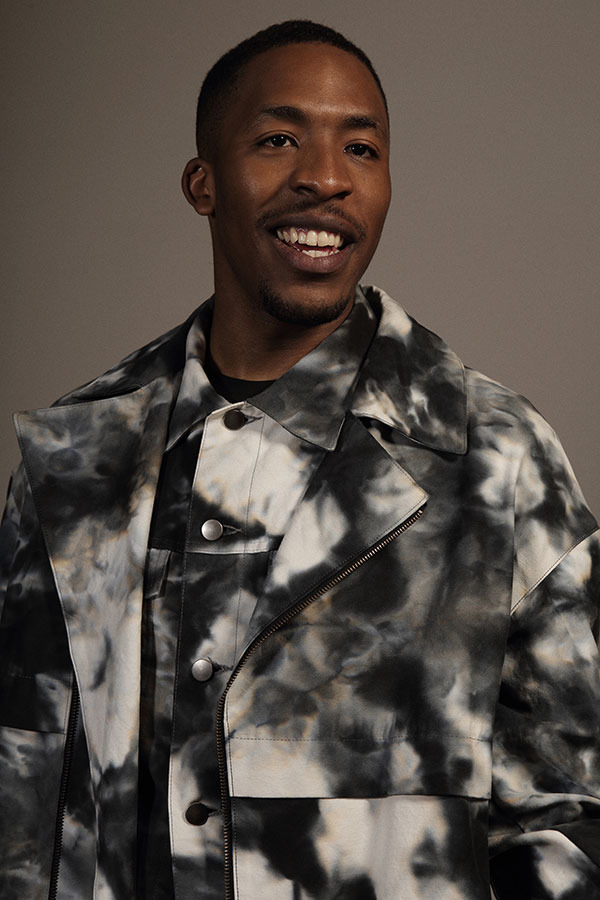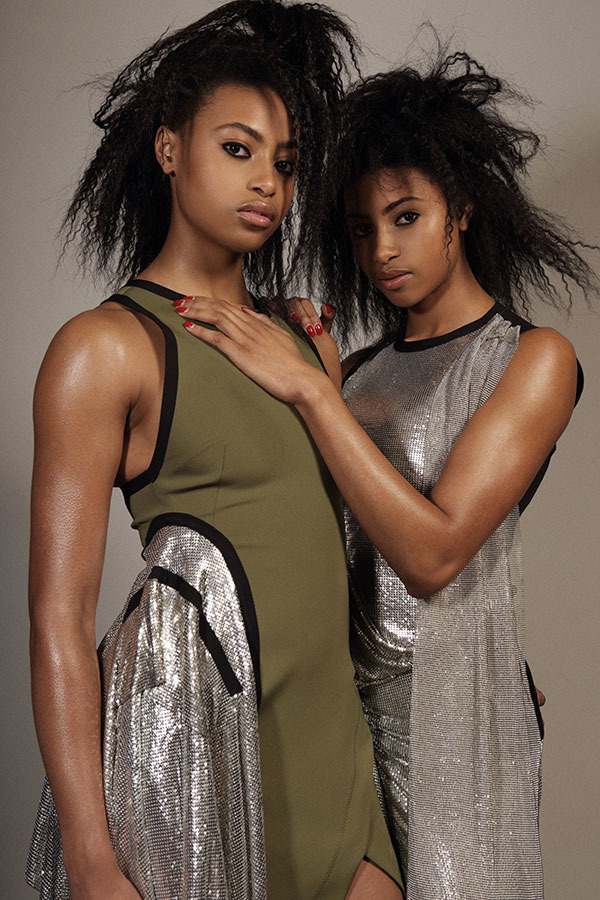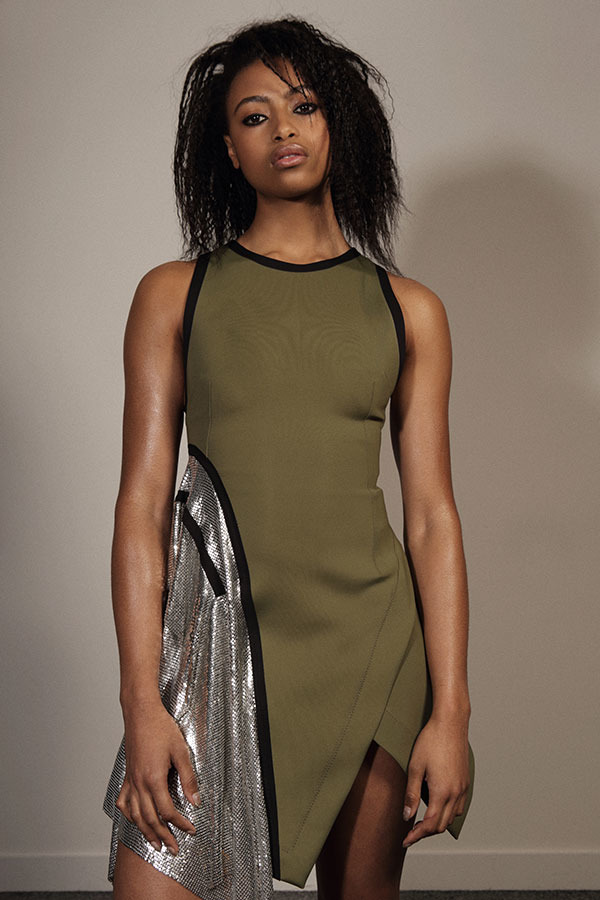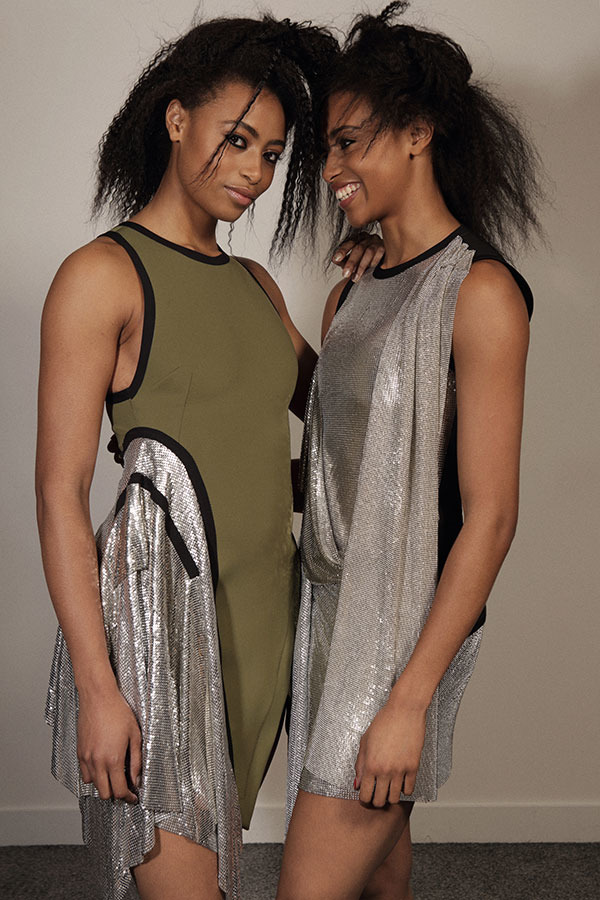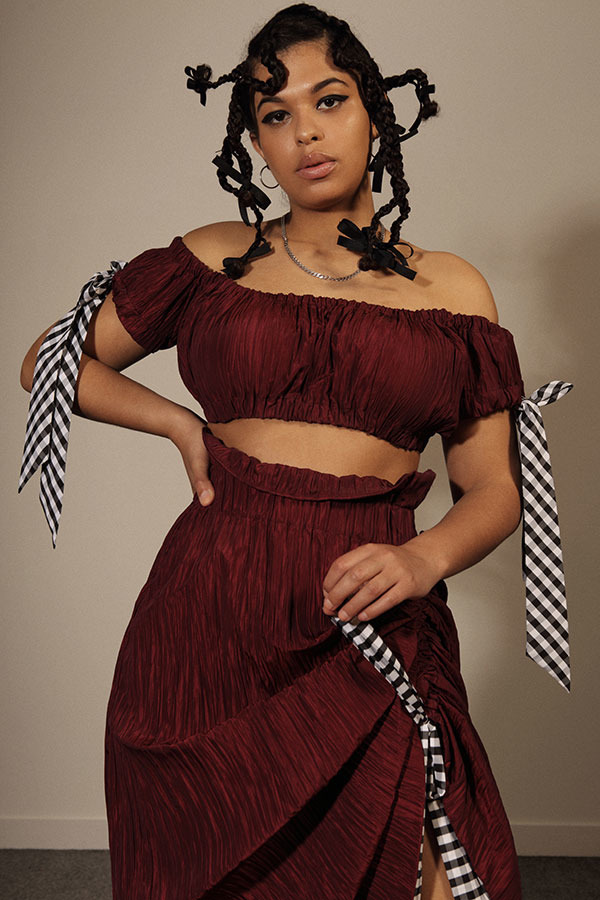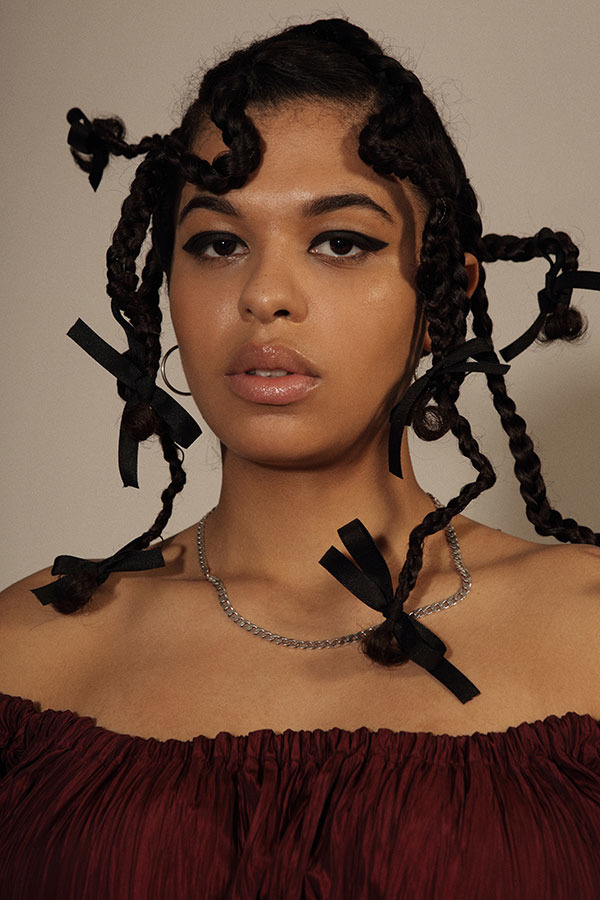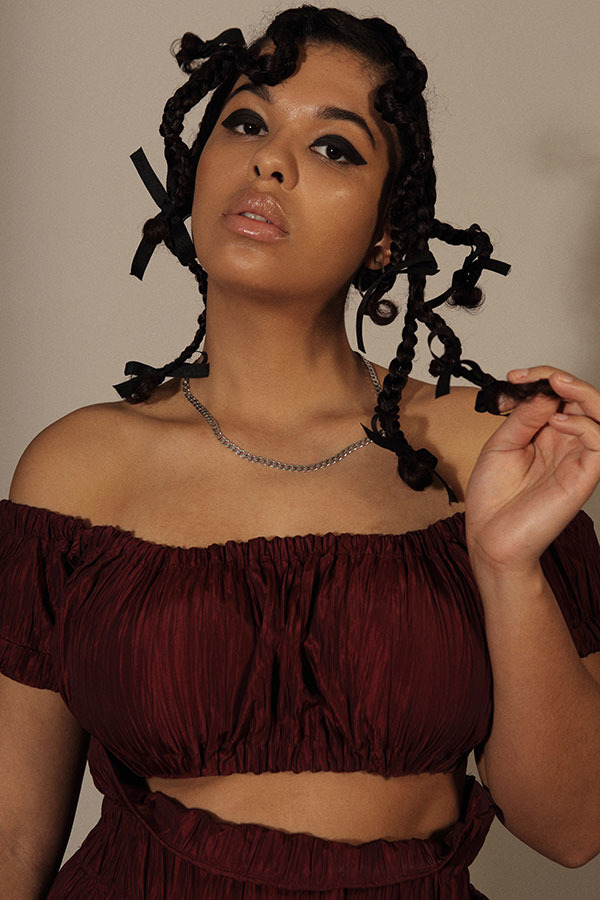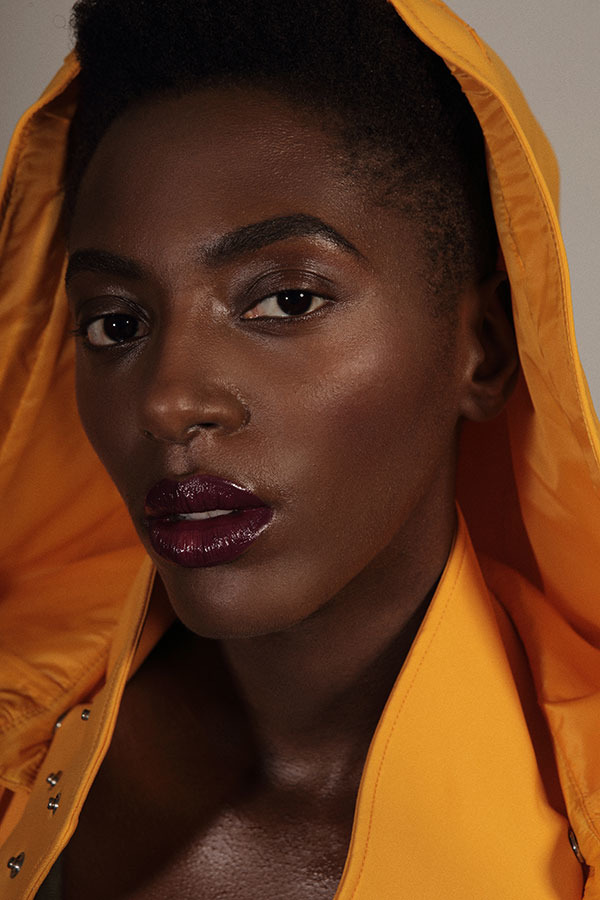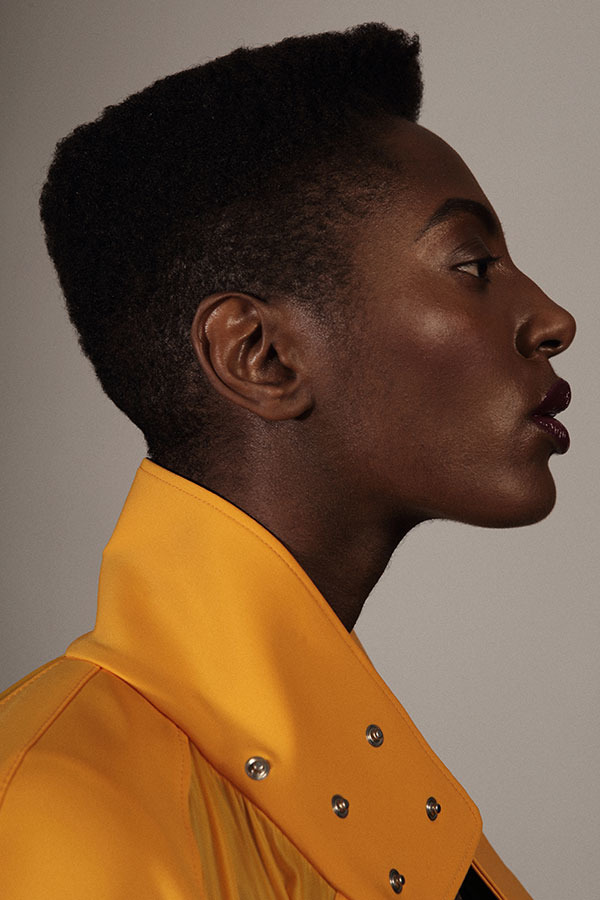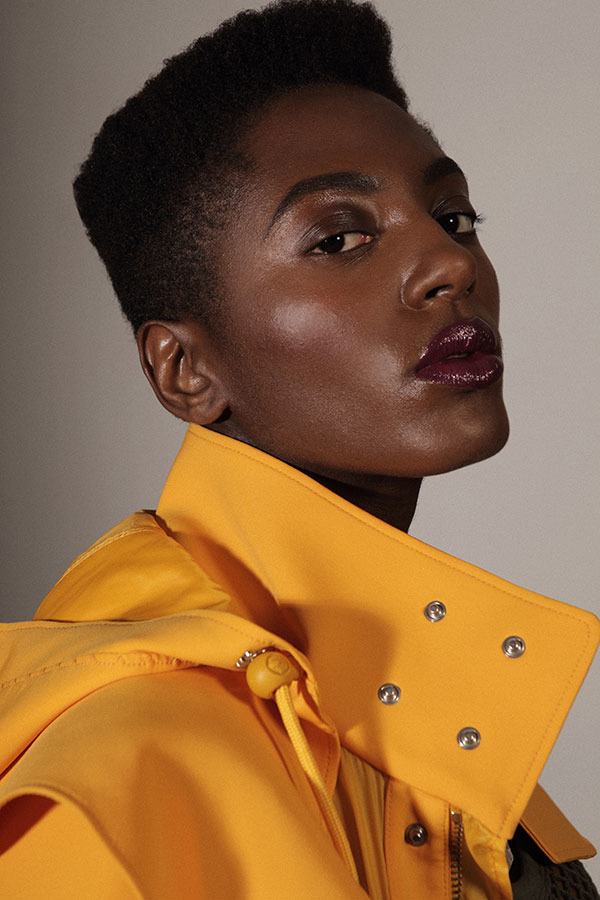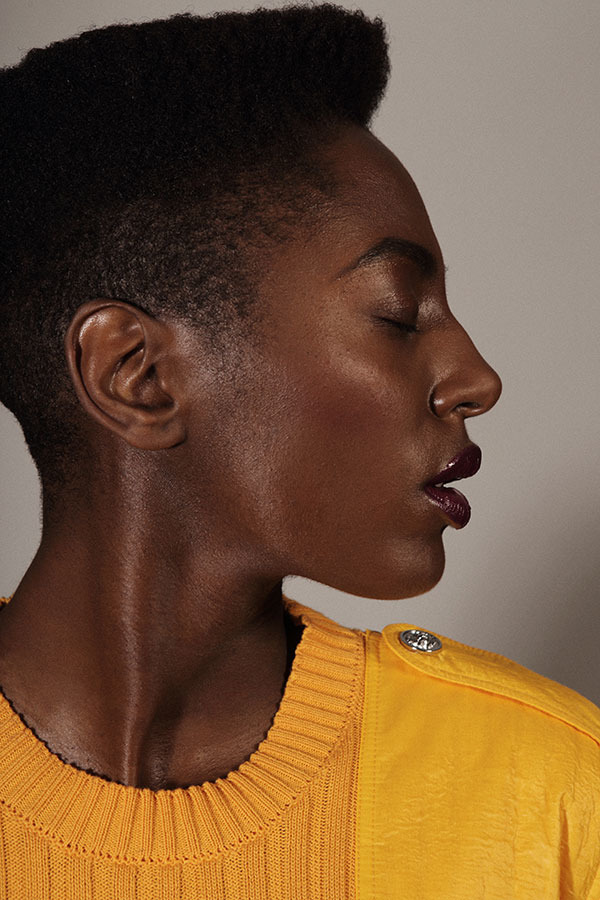Interviews – The Next Wave
All clothes Liam Hodges
James Massiah
James Massiah – or Mæssiah, if you’re in the know – is the London born poet recoding the conventions of lyricism for the 21st Century. Imaginatively blending the lexical smarts of poetry with performance has attracted the attention of the coolest of global brands and esteemed artistic institutions alike, garnering widespread acclaim for his distinctive take on spoken word. Here he sits down to tell us about the importance of funk, making people squirm and being at the axes of the arts.
Tell us about founding The A and the E project. Does the æ grapheme hold a particular significance to you?
While I was at university, I would go and perform for different student unions and Afro-Caribbean societies, and I noticed that they’d always spell my name with an E instead of an A. Being the sort of person who looks for patterns and meanings in things, I coupled this with the fact that because I wasn’t big on drinking, partying and hooking up at the time; people began to develop this notion of me as a kind of puritan. When I would confess that I really wanted to fuck someone or that I was really into the Roadside G’s, it would jar with their perception of me as a holy man – no more so when they discovered that I was also a recent adherent of atheism. “But, you’re a poet! Poets aren’t supposed to be like that!” , increasingly however, I’d notice things about myself that were at odds with people’s perception of how I ought to be: as a man, as a black man, as a straight (at the time) man – as a man who went to a state school and so on.
I remember drawing up a sort of pros and cons chart, with A on one side and E on the other: A being representative of the bad, carnal, base self; and E representative of the spiritual, good or ‘pure’ self. I started to fill it out with characteristics and traits that were present in me at different times and in different situations, and was the beginning of a long journey into studies on relativism, objectivism, ethics, determinism and moral nihilism. The A and The E (Æ) has represented many things for me, but at this point in the journey, it’s the symbol of it’s own philosophy.
Amoral egoism is the notion that good/bad and right/wrong do not objectively exist in terms of morality at least, and that each living thing exists for it’s own pleasure. Within that is the premise that there is no right or wrong way for anyone or anything to be. A black person does not have to be like this, a gay person does not have to be like that. A woman does not have to be this, an older person does not have to be that. It’s a non-prescriptive and sort of ecumenical ideology, fostering what I like to think of as absolute empathy within anyone who adheres to it. Once you come to terms with the idea that everyone around is, at the most basic level, motivated by the same thing as you, it’s impossible not to empathise with them. I think there is a great amount of peace that comes with that.
What draws you to investigate themes of sex, religion and mortality in your work? Why do you find these themes in particular so powerful and compelling?
Certainly my religious background. I developed a fascination with sex, magic and the occult, as they were all the forbidden fruits that represented the flipside of the circumspect religious life of prayer and abstinence which I had come to know.
I remember being frustrated with the fact that I’d never seen a demon, an exorcism or anything supernatural, and I think that is what may have eventually led me to question my faith. I began writing more about this invisible spirit world to fulfil my own fantasies, and also as a means of expressing that which I found hard to say in concrete terms.
I also try to write the work I’d want to read, and I’m drawn to dark, mysterious and often violent tales – enjoying the voyeurism of glimpsing into someone else’s private world and seeing things that polite company wouldn’t have you see. That’s what I refer to as the ‘funk’ in my writing: that thing which would be off putting to so-called ‘respectable’ audiences, or those people who think in objective moral terms. Those are the people I wish to alienate with my work, and I take pleasure in watching them squirm.
Living in London is also a great source of inspiration to you; how has the city changed in your lifetime, and how have you responded to this through your work?
London has changed quite a lot in the time that I have been here…my whole life! But then so too has the world in many ways. I do think about how technology has affected people’s behaviour in the capital, and what the effects of social media are on the city’s youth.
I suppose in terms of race and class, there are places and people within the city that in days gone by, I probably would have never come into contact with; but as I and culture itself changes, some of those walls are removed – and for the ones that aren’t, the gatekeepers are willing to allow you access on account of who you know or what you’ve achieved. These are all things which find their way into my work, perhaps in more subtler ways in my most recent writing, but anyone who knows me or interacts with my work knowing I’m a Londoner would probably be able to see that connectivity.
You are also a DJ, when did you begin to recognise the creative parallels between music and your poetry?
I used to run an event called The Poet & The Beat, a pre-cursor to the The A & The E when it operated as a performance night that sought to alter perceptions of what a poet is versus what a singer, DJ is or a rapper is. I wanted to demolish the idea that poetry is exclusively something to be enjoyed whilst sitting quietly and to create more of a party around it.
These nights put me in touch with lots of DJs and musicians around London, and when I moved away from performing live music, I still retained the desire to fuse the two. I went on a journey of discovery and found punk, hip-hop and house tracks that all played with voice, the spoken word and poetic delivery. I host a show on NTS now which is dedicated to that relationship, and it all comes down to a desire to move people. In my acronym for the funk, the K is for kinetics, and so that is always the mission, whether I’m DJ’ing or performing – that is the goal.
What is the most surprising or memorable reaction you’ve ever had to your poetry?
I recently recorded a track with a friend of a mine, a young producer named Cameron who sent me some instrumentals to work to. I wrote one about my grandma, who’s got dementia and he told me that upon receiving the dry vocal he played it allowed to his mum, and it brought her to tears.
There have been other times when people have cried to poems of mine – again my own parents were a little teary eyed when they’d heard a poem I’d written about my maternal grandparents’ houses in the Manchesters of Jamaica and the UK. Laughter is cool too, but I guess if your work triggers any kind of involuntary reaction in people, it’s touching them on a deeper subconscious level – which I think can be seen as an achievement.
Do you feel poetry as an art form has gone through a renaissance of late? What do you think this says about the bigger picture of society?
Maybe. I feel like it’s always been around, and almost feel like it always will be in one form or another. I suppose we’ll see the success of certain writers as indications that people want it, but I don’t think ‘poetry’ in perhaps the most conventional sense of the word will command as high a fee or as broad a space in cultural consciousness.
I suppose there is a kind of divide in the themes and styles that certain poets adopt, and some stuff may be seen in adverts, on instagram and performed in theatre and cabaret tents at music festivals. However, there is the other side where awards are given, journals are published and poems are featured in newspapers for critical reviews and analysis. I think every section of society has its heroes and poets, and as long as there are things to say – there will be people to say them.
I know there are elements within poetry that are seen as a space for the angry and the disenfranchised, and I think that’s how many people see art more generally. There have been big social and political changes in recent times, and I think people are keen to hear them spoken about in a way that helps them make sense of it, or in a voice that confirms their viewpoint
How does poetry fit into the wider canon of performance art to you? Do you feel it has emotive capabilities that something like music or moving-image does not?
I suppose I spoke a bit about this in relation to music, but it’s definitely different. I think there are things an audience would expect from one style of performance that they wouldn’t expect from another. I remember being at this Travis Scott performance where many in the crowd were perhaps a little too starstruck (or stoosh) to really get into it and he shouted, “Come on ya’ll, this the rodeo, man! This ain’t no poetry reading type shit man! I came to raaaage!”.
I thought it was the funniest, most profound thing. I didn’t take it as a diss to my field, it’s just that if you got to see one thing, you don’t expect to see another. If a rapper pulled out a book of rhymes you’d think it was an indicator of poor preparation, whereas if a poet did the same thing you might not be quite so disappointed.
There is a lot of overlap though, like poets performing in bands – delivering theatre style monologue performances of comic one-man-shows. I know that I like to perform to small rooms where I can interact and engage with the audience a little, and respond to questions about the work; or to perform with a DJ in a dub style and just riff on top of the music. Each poet will have their own way, each actor, each comic, each rapper. I guess you might not expect from Lee Evans what you would from Stewart Lee, or from Common what you would from Danny Brown, or from a silent movie what you would from an action film. Each thing could be taken on its own terms.
You have been prolific in giving readings of your work at world-famous venues, and people can listen also online; do you prefer for your work to be listened to or read? Do you find there is a differentiation in how audiences absorb your work when read versus listened to? If so, why do you think this is?
I’ve been thinking a lot about this recently, as when I’m cycling and on the move I like to listen to readings of poems. Some are by quite famous authors, who perhaps would never have had to encounter the subtle, underlying racism/classism of such a question as “So what kind of poet are you?”. I think it’s the same thing as reading an Arthur Miller versus watching A View From The Bridge, and within that, there are different ways the play can be staged, acted and directed.
I perform a lot because it seems the quickest way to have my writing seen. People know stand-up, they know acting, they know rapping, they know a speech, they know a reading and they know an english lesson: so what I do sits somewhere in between the axis of each of these. There are tricks you can play with words on a page that may help to convey the meaning or intention of the piece in question, and though you may lose that in reading a piece aloud, there are other things to be gained.
I know it’s tricky to sell a performance in the way you might sell a book or an album, but then with changes in the way people consume media, there is a lot of emphasis on the importance of touring and performing. There are many things to consider, even in the contrast between the filming of a poem and its audio recording – what is gained or lost?
I suppose some producers are really precious about vinyl, and it reminds me of some poets who are precious about publishing in some ways. I suppose to date, the recognition I’ve received has been more for the performance and viewing of my poetry than for the reading of it on a blog or in a book. I’m aware of what that does to the perception of the writing or its quality, such that my poetry doesn’t come with the bells and whistles of a live performance.
It’s funny because more and more people are requesting to read my writing, so they can analyse, pore over and digest it more, and I take that as a compliment. A poem can do different things at different times and in different ways, and so I wouldn’t be too sure on placing more value on one way than on any other.
I know that I enjoy giving readings, because you can see the reaction of the words in the moment. I also know that people enjoy seeing me perform, they enjoy the interaction and seeing me deliver this poem from memory and sharing the moment with others in the audience in this particular space – drinking afterwards and discussing the themes. Then again, I know that people have seen my writing in magazines and told me how it made them feel in their own private space, or whilst on the train and neither experience is more sacred than the other.
What’s next for you, James?
I’m working with a few producers at the moment and doing lots in the studio. I’m also hoping to finish writing a series of poems on life and death pretty soon, which I’m hoping to release in a variety of formats. Other than that, just odd bits of work here and there; relaxing, partying and generally just trying to make the most of life…as I subjectively perceive it to be.
All clothes Versus
Cheriece and Shannon Hylton
Cheriece and Shannon Hylton are fast becoming poster girls of British athletics, and with good reason too. Behind vivacious smiles and spirited camaraderie lies a palpable sense of dedication that has seen both of the sisters take to the podiums of some of sport’s toughest trials. Here, we catch the twins as they take a rare breather to talk personal bests, living in the moment and facing adversity head on.
How do you psyche yourself up before you perform?
Shannon: Every race is an opportunity to change my life. I love winning and I love competing. You have to be mentally stronger than you physically feel. To get me pumped I listen to feel good/upbeat music. Ice Melts by Drake is currently my go to.
Cheriece: Before I get into the blocks, even before the last rep of a deadly session, I always say “This is mine”. It gets me pumped and mentally ready-to-go. Those three words create this buzz inside of me and reminds me of what I want out of that race and what I want to achieve. I speak my goals into existence.
What goes through your minds when you’re competing?
Shannon: In the fastest part of the race you need to feel the slowest. You need to have a long enough stride to generate enough power through the track, rather than simply spinning your legs over which won’t produce a lot of force – thus you’ll cover less ground. When I’m in the set position, and my glutes and hamstrings are firing, I think about three trigger words: long, drive and patience. Long so each stride is as powerful as possible, Drive to maximise the full power generated from my long strides; and Patience because I have to be efficient with my energy.
Cheriece: Before I race I’m aware of my competitors, I’m aware of the spectators, I’m aware of the media – I’m aware of the entire race environment. But when I get on that start line, I drown out every bit of noise. Noise from the spectators, as well as the visual noise of the competitors in the lanes outside of me…everything. It’s just me and the track. I treat every race the same: get out hard and stick to the plan.
Do you have both have different strategies when it comes to training? Are there particular mental or physical techniques that you find useful to get yourself in the game?
Both: We have the same approach when it comes to training. We always focus on the first 24 hours in front of us. We think about the here and now and don’t get carried away with what could happen. We make sure we do our bit, day in and day out, in hope of getting that bit closer towards our goals. Training is practice – practice for race day. In training, we practice what we are going to do when we compete, so we see every training session as a little stepping stone to reaching our ultimate goal.
Cheriece: 400m training is equally draining mentally as it is physically, so when my body can’t go anymore I self-talk myself into finishing that last rep, and visualise myself running the times that I want to.
Shannon: When the going gets tough, I say my season goals out loud.
How would you describe your individual performance styles? What are your strengths?
Both: We are very focused and goal driven. We love seeing results; not just numerical results like higher testing scores, but feeling good when we run as well. When it comes to racing, we are both very quiet in warm up. That’s our strength as performers. We are naturally very chatty girls and we laugh at everything! But when it’s race day, the headphones come on and it’s show time. We’re there to win.
How advantageous is it to have an athlete as a sibling? How would you describe each other’s personality?
Shannon: It’s so nice to have my twin with me because I’ve always got someone there who gets it and understands my decisions and why I’ve made them. Successes aren’t the only things we celebrate – we celebrate the good times and the bad, together. Cheriece is very driven. She does 400m and the training for that (putting it nicely) is disgusting! She hates doing the long runs but she’ll finish the reps because she knows what she wants and where she wants to be.
Cheriece: I love having Shannon with me. She’s my best friend and my best competitor. I love doing the little things as well, like singing our hearts out in the car on the way to training and having to do “Rock, Paper Scissors” to see who’s going to meal prep for the next session. Behind the glamour of the medals and personal bests (PBs), there’s the hard training sessions, the injuries, the setbacks and more. Shannon’s seen me through everything – the good times and the bad. Shannon is a fighter. Nothing will stand in the way between her and her goals. She is very committed to what she wants.
How do you overcome adversity if it seems that the odds may be stacked against you?
Shannon: “You can’t have a rainbow without a little rain”. In sport, it is inevitable that there are going to be setbacks. As an athlete, I am constantly pushing my body to the limit, so training will take a toll on my body in one way or another. I’ve had injuries in the past, but they’re little blips. I remind myself that yes, this is a bad time in my career, but it’s a passing cloud and I’m ready to make way for clear skies.
Cheriece: 2016 was a tough year for me as I got injured in late January which ruled me out of competing for the year. It was my first major injury so it was hard for me to deal with at first. I was constantly thinking, “Why me? I did everything right”, but the reality is that life as an athlete isn’t a bed of roses – And these things happen to the world’s best! As an athlete, I embrace whatever journey I’m on, as I am a strong believer in that everything happens for a reason and that some good has to come out of the bad. Whether that be highlighting other weaknesses I was unaware of, or simply allowing me to have time for myself – some good has to come out of the adversity I am facing.
What are some of the biggest challenges you have faced in your careers so far, and how did these events affect your performance?
Shannon: The hardest part of my career was tearing my hamstring two weeks before Rio 2016 selection. My season ended prematurely which was annoying but there’s always Tokyo 2020 which is my main aim.
Cheriece: 2016 in general has been the biggest challenge of my career so far. It was the first year not competing in the 400m but there are better things to come. The most exciting yet nerve wrecking challenge was being put on the last leg in the 4x400m at the 2014 World Junior Championships in Oregon. Oregon is the home of TrackTown in the USA, so the crowd was insane. It was the biggest stage that I’ve ever competed on, but with a strong team around me and a massive adrenaline rush I managed to anchor us home with a silver medal, which was incredible.
How do you identify the areas in which you want to grow?
Both: Our coach Ryan Freckleton is very technical and we’ve been working really hard on improving little things to help the big things. We’re not perfect, but we’re a work in progress.
What’s next for you, Cheriece?
I’m off to Portugal for a warm weather training camp in the next couple of days, which should be exciting! It’s my first camp where I’m training abroad so I’m really looking forward to it. My main goal for this year is to make the World Championships in London and have a healthy competitive season. I can’t wait to get back on the track again!
What’s next for you, Shannon?
I’m going to a Warm Weather Training camp in a few days and then my first competition will be in early May. My main aim for this year is to be in London for the World Championships. It’s been a long-term goal of mine since competing at the World Junior Championships in 2014. London 2012 was a massive inspiration for me – I’d love to be there competing in my hometown.
All clothes House of Holland
Cosima
Cosima is the London native building serious momentum on the underground pop scene. Noted for the emotional volatility of her darkly textured timbre, the 23-year-old singer-songwriter sits down to tell us about making images for women, directing music videos and the most dangerous thing she’s ever done.
What does your music say about you?
Everything. Probably too much.
What kind of energy do you like to create when performing live? What makes a great gig for you?
I like to switch off and let my emotions do their thing. I don’t like to overthink it, I just like it to be honest. If I’ve cried its been a good, cathartic gig it doesn’t matter if I’m watching someone else or playing myself.
You often direct your own music videos. How important to you are these visual elements, and what are the communicative strengths of the visual versus the sonic?
So so important; I’ve always been drawn to film and music videos, so for me directing is being able to engage with another passion I have. I think a visual can contextualise a song, or even re-contextualise it – and it’s really to be able to play with that. I also think its really important that more images of women are made by women; because visuals can be powerful both positively and negatively.
Tell us about your latest single, ‘To build a House’. What inspired the direction of the music video?
I wrote the song about my father and the video was the hardest I’ve done so far! The song was so personal so I was constantly arguing with myself on whether to be literal or take it somewhere else. In the end I decided I just wanted to focus on the emotions that came with my abandonment issues; that feeling of harming yourself and doing stupid stuff, so that the missing person will come back. My DOP mentioned he wanted to film a car tracked by drone lighting; and I thought what’s more dangerous than hanging out of a fast moving car.
When it comes to performance, who are your biggest inspirations? How do you think their influence has manifested in you as an artist?
Anyone who really gives a part of themselves on stage; for pure unfiltered feeling, Nina Simone and Judy Garland, for swag Sammy Davis Jr and Slash for a combination of both PJ Harvey and Tina Turner. I think seeing them be the most powerful versions of themselves, has inspired me to do the same. I also saw Stefflon Don the other night and her stage presence was so powerful!
What’s next for you, Cosima?
More music, more videos and more shows. I’m playing my second headline show at The Bussey Building in Peckham on the 3rd of May, which I’m really looking forward to.
All clothes Versus
Yrsa Daley Ward
Storytelling is in the DNA of Yrsa Daley Ward, the Chorley-born poet with the ability to break hearts with all but a stanza. Following the release of her acclaimed autobiographical title, ‘Bone’ in 2014, Ward has amassed something of cult following for her deceptively minimal and elegant approach to poetry; and here she recounts her passionate belief in the power and beauty of communication.
As a poet, actress and writer you work across a creative spectrum. What ties all of these things together for you? Do you find they satisfy your creative appetite in different ways?
They’re really all mediums of storytelling, which I’m completely obsessed by. I write alone in a darkened room and acting is mostly collaborative. One coin, two sides.
You are still perhaps best known for your poetic work, what attracts you to this medium and why do you think it has struck such a chord with people?
I think that is such a beautiful way of capturing emotions, usually in a simple and concise manner. I’m attracted to the idea of saying a lot of things with few choice words. Hopefully it’s effective in communicating, speaking to the heart.
Your work is so intimate and honest; how easy is it to share the details of moments that otherwise might have remained private? What do you hope to achieve by being so candid?
I hope to achieve a connection of a sort with the reader or listener, by speaking to some of the things in life that we all recognise. This makes any fear about speaking about more private details fall away. Sharing makes most things easier, I think.
One can imagine you speaking aloud whilst reading your work; do you get the chance to perform your poetry often?, and do you find the reaction of a live audience is different to that of someone reading your work in private?
It’s completely different; there are those who prefer poetry on the page, conversely when some people hear it spoken, it speaks to them in a way that they connect with. I love to do both…both expressions do different things.
Are there any works you have written that have remained particularly close to your heart through time? Why do they have such staying power for you?
Bone, my collection of poetry and stories is extremely close to me. So far, it’s the truest thing I’ve written.
The duty of art is to communicate, so as a writer, how do you view your craft and it’s contribution to culture? Can the experience of a great piece of writing be comparable to that of a painting or piece of music?
Of course. Art is art. It is a lifeline and we need it today as much as we ever did.
What’s next for you, Yrsa?
Several new publications between now and Autumn ’18 – including one collaborative project with writer Nayyirah Waheed. I cant wait to share them with you.
Photographer: Lucas Suchorab
Stylist: Shirley Amartey
Stylist Assistant: Katarina Silva
Hair RYUTA SAIGA using Bumble&bumble
Make up INGA KUNIGONYTE using MAC Cosmetics and YSL beauty

